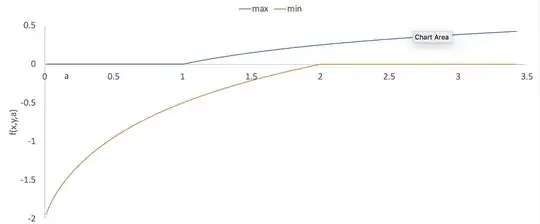Update: Posted in MO since it is unanswered in MSE
Let $0 \le x,y \le 1$ and $a$ be a real. Consider the function
$$ f(x,y,a) = xy^{y^a/x^a} + yx^{x^a/y^a} - x^a - y^a \tag 1 $$
For a fixed $a$, the graph of the maximum and the minimum value of $f(x,y,a)$ shown below.
The graph shows that for $a \ge 1$, there is a constant $C_a$ depending only in $a$ such that $xy^{y^a/x^a} + yx^{x^a/y^a} - y^a - x^a \le C_a$ and similarly for $a \le 2$, there is a constant $c_a$ such that $c_a \le xy^{y^a/x^a} + yx^{x^a/y^a} - y^a - x^a$. Also, $0\ <a < 2$ is the only interval in which $f(x,y,a)$ has non-zero maxima and minima for every $a$.
Some experimentally observed examples of inequalities belonging to this family are
$$ -\frac{1}{2} \le xy^{y/x} + yx^{x/y} - x - y < 0 \tag 2 $$
$$ 0 \le xy^{y^2/x^2} + yx^{x^2/y^2} - x^2 - y^2 \le \frac{1}{4} \tag 3 $$
$$ 0 \le xy^{y^4/x^4} + yx^{x^4/y^4} - x^4 - y^4 \le \frac{1}{2} \tag 4 $$
Question 1: Can we prove that for every real $a$, there exists $c_a$ and $C_a$ such that
$$ c_a \le xy^{y^a/x^a} + yx^{x^a/y^a} - x^a - y^a \le C_a $$
Question 2: Can we express $c_a$ and $C_a$ in terms of $a$?
